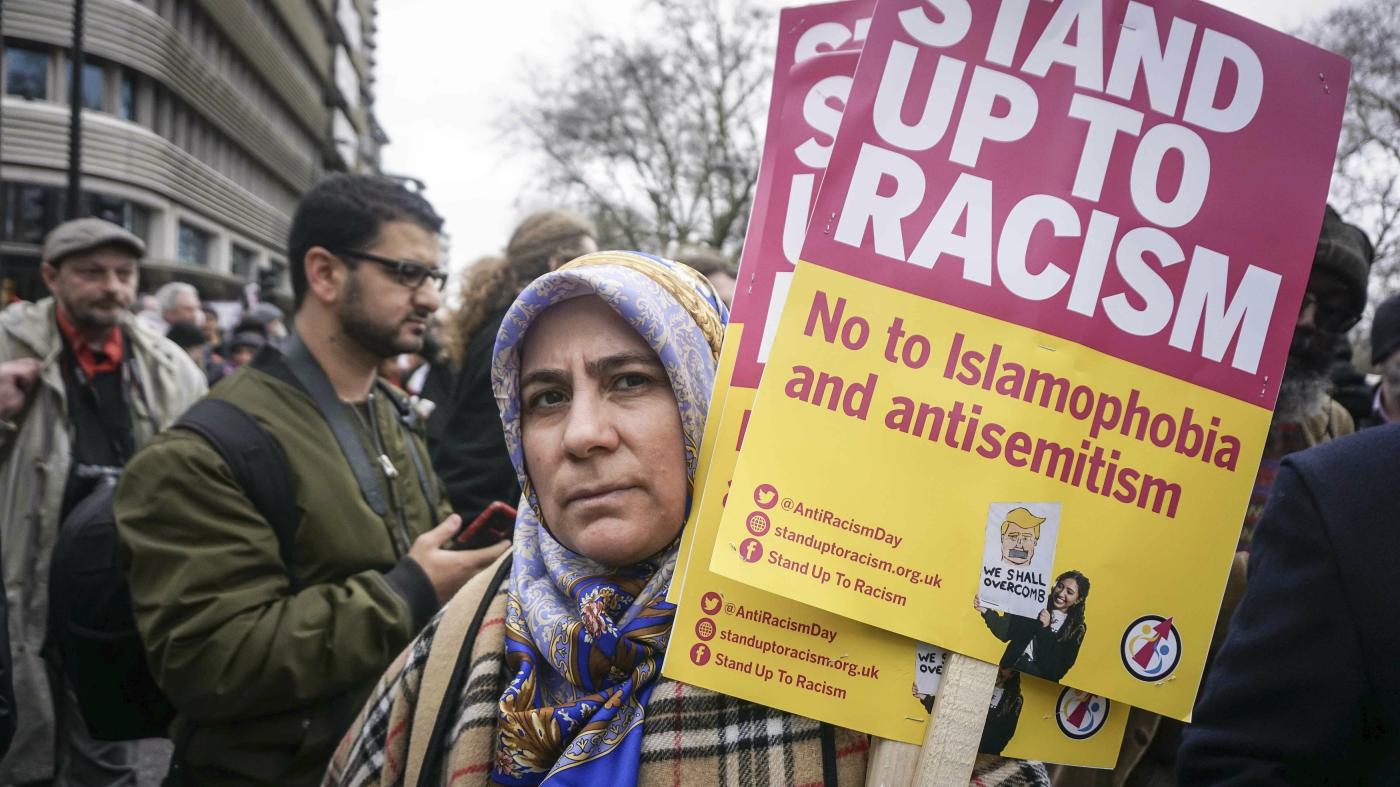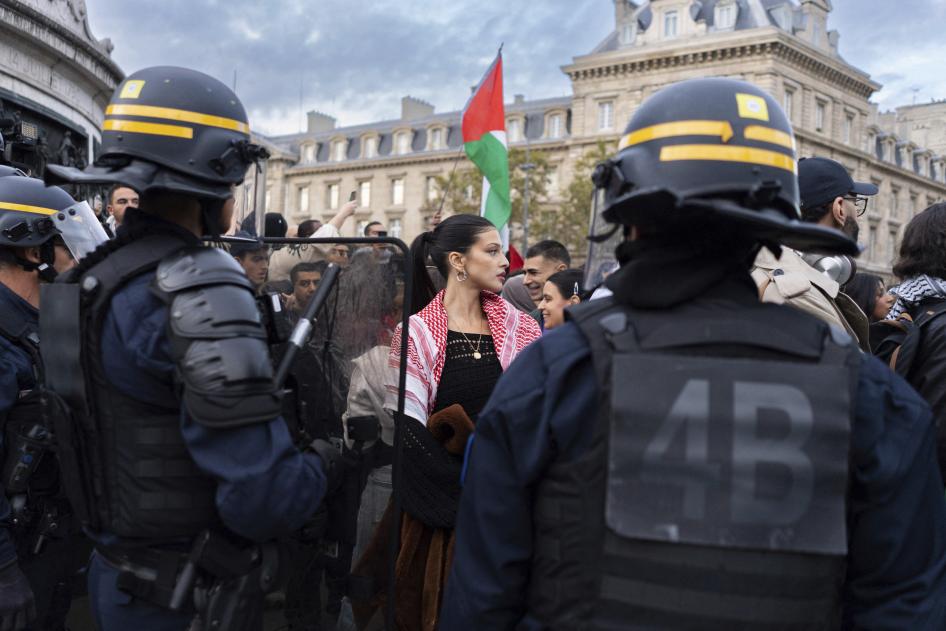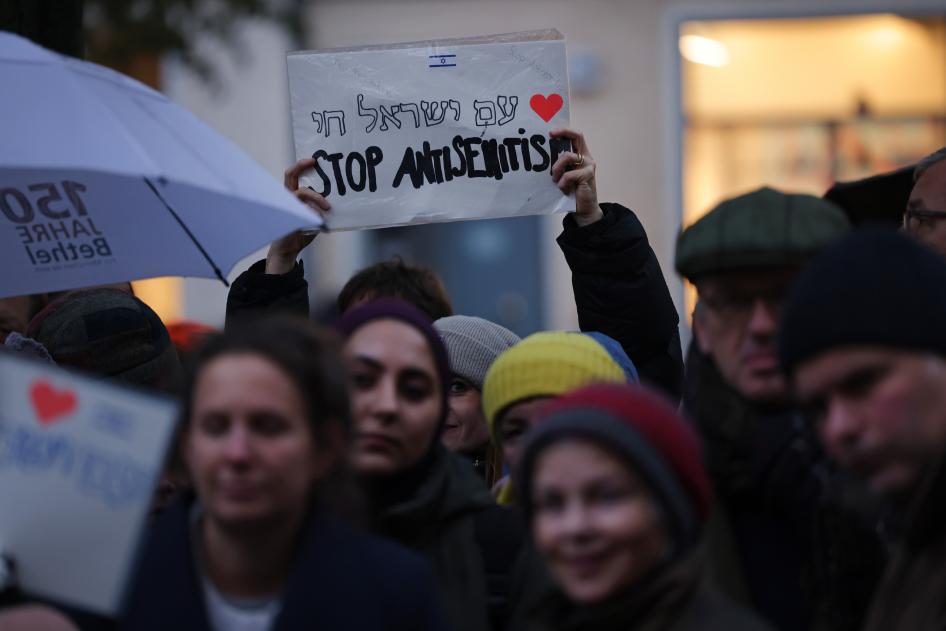Amy Braunschweiger speaks with Human Rights Watch’s Almaz Teffera, who researches racism in Europe from Berlin, and George Wilkes, who researches antisemitism from Edinburgh, about the failure of European governments to effectively address antisemitism and all forms of racism and what should be done now.
Historically, escalations in Israel-Palestine have led to spikes in antisemitic and anti-Muslim hate speech and acts. But is there more context to this?
Almaz:
There has been a lot of talk about the rise in antisemitic and anti-Muslim hatred. But in fact, such hate started long before October 7. We have seen stark increases in attacks against Jews and Muslims, yet European governments have failed to adopt adequate policy responses.
We have now seen international attention and condemnation around the latest rise of this hate, and rightly so, but what doesn’t make headlines are the decades of lived experiences of communities facing racism and intolerance, particularly anti-Muslim hate and antisemitism, every day.
True, according to the European Commission, 12 out of the 27 EU member states have adopted national strategies to combat antisemitism. Germany, for example, collects hate crime data for antisemitic acts and allows for their prosecution under penal law. Germany also introduced appointed commissioners tasked with addressing antisemitism at the federal and Länder [state] levels, as well as within the police and public prosecutor’s office. Such appointments, however, don’t exist to give visibility and support to other minorities facing hate crimes and racism, including anti-Muslim hate and racism. This signals to affected people and communities that they are less of a priority.
Still, when it comes to antisemitism, these are crucial steps. But effective strategies should be evidence-based, and right now, most European governments, except for the UK, don’t have anti-discrimination data to identify where policies currently fail.
This is one reason why the way governments have supposedly tackled antisemitism is falling short. But instead of taking responsibility for this failure, government officials in some European countries have specifically called on Muslims to distance themselves publicly from antisemitism – as if antisemitism in Europe could be attributed solely to an entire ethnic or religious minority. This is not only stigmatizing but deflects from the fact that governments have failed to effectively address the deeper assumptions which sustain antisemitic prejudice and behavior.
What governments need are anti-discrimination or equality measures – focusing on protection, prevention, and education – that are based on strong data and evidence of antisemitism and other forms of racism and intolerance.
George:
Over the last 20 years, a wave of hatred has fed antisemitic acts, including widespread abuse and harassment, low-level violence, and even murder in European countries. We’ve also seen this in North Africa and the Middle East, North America, South America, Australia, and other parts of Asia.
In times of crisis, including during escalations in Israel-Palestine, some prejudiced people blame Jews, Muslims, and other minorities for the world’s problems and power imbalances. They blame minorities for the existence of Covid and for government action against Covid. They blame Jews for the economic crisis, and they blame Jews for the government responses to the economic crisis.
These prejudices are deep in our culture. It’s not really about Israel-Palestine. Rather, it’s structural racism, which impacts Jews and Muslims in distinctive ways. We’re all potentially affected by racist assumptions we need to work through.
It’s true that over the last decade a number of Western governments have developed plans or strategies to tackle antisemitism, and that today, there are also some plans targeting Islamophobia. But the many specialists working on combatting hatred and hate-based crime know that these government plans need to do more to deliver protection for the communities whose lives are blighted by prejudice.
Over the past two months, we’ve seen the banning of pro-Palestinian protests, in part citing concern over possible violence, incitement, and antisemitism. This violates the right to free assembly and expression, but at the same time, authorities have to ensure respect for the rights of others, like the right to security for Jews. How should authorities address this?
Almaz:
In many European countries, there have been disproportionate and unnecessary restrictions imposed on pro-Palestinian protests. Pro-Palestinian protests should not be conflated with antisemitism. While most protest restrictions have now been lifted, freedom of expression at these protests and generally of pro-Palestinian voices remains a serious concern.
As key democratic rights, freedom of expression and assembly can only be restricted in exceptional circumstances, for example to protect the rights of others if they are genuinely at risk or for public security or other such public interest reasons. As with every protest, authorities should make case-by-case assessments. Instead of blanket bans, authorities should meet with protest organizers and discuss ways to help ensure the protest will be peaceful.
If open collaboration between organizers and authorities happens before and at a protest, authorities don’t need to ban protests where most demonstrators are not expected to incite violence or target minority groups with hatred. If any crimes do occur, authorities should prosecute them according to criminal laws.
There are ways both to protect free speech and recognize Jews’ security fears and effectively address antisemitism.
European governments should be careful not to create double standards. I’m thinking of far-right speech, for example, which has been on the rise in Europe. Antisemitic, racist, and anti-migrant hate speech at Europe’s far-right marches causes people from many marginalized communities to fear for their personal security and even their lives. Authorities should take all antisemitic acts and speech, as well as all racist acts and speech, seriously and condemn them. And they should avoid applying more restrictive standards in one situation than in others.
Normally, we think of antisemitism and racist sentiments being the purview of right-wingers. Today, we’re seeing more liberal politicians making racist comments. What does this mean?
George:
Some people think that real antisemitism is basically being a Nazi, and as long as you avoid being a Nazi, you aren’t antisemitic.
But antisemitic prejudices are deep in our culture. There are liberals who believe myths about Jewish power and influence or who stereotype Jews as greedy, angry, or perverse.
Some people even try to present Jews as the force behind immigration or the power behind a government’s anti-Covid measures. These tendencies to accept stereotypes are not unique to any one political movement.
Since October 7, some people who see themselves as left-wing and anti-racist have used language, intentionally or unintentionally, that traces back to the Nazi era or to antisemitic tropes.
It is also important to recognize that people with Islamophobic views target Muslims today, not solely because of their religious beliefs, but because Muslims are stereotyped as wanting power, wanting to threaten or overturn the societies in which they live.
These stereotypes, which can morph into conspiracy theories, feed hatred against minorities. They also divert democratic parties from advancing public policies grounded in facts rather than perceived public fears.
Almaz:
Racist, Islamophobic, antisemitic, anti-migrant rhetoric that smeared and stigmatized any minority group used to be presented as a problem associated with the far right, though in fact waves of intolerance have impacted European politics time and again. Today, we find ourselves again in a time when open prejudice is spreading in the political mainstream.
Since October 7, key European political figures have specifically called on Muslims to make public declarations against Hamas and antisemitism. We also saw European governments using the crisis to propose immigration policies that risk discrimination against people perceived to be Arab, Palestinian, or Muslim. For example, France’s interior minister linked a school stabbing to the hostilities in Israel-Palestine, using the crisis to justify toughening an already controversial immigration bill that would make it easier to expel foreign nationals with suspected links to “radical ideology.”
But we can’t combat antisemitism by blaming Muslims or silencing legitimate criticism of Israel. It’s blaming a group of people, based on assumptions about what they think and who they are, for the failure of European governments to effectively address antisemitism.
In Berlin, in an attempt to address racism and antisemitism in schools, education authorities were allowed to prohibit the wearing of Palestinian scarves. Is this what peaceful coexistence and appreciation of our diversity looks like in Europe? I don’t think so. Does this protect Jewish pupils that sit in the same classroom? I don’t think so.
Governments are looking to Germany to see how you move on from such a dark chapter that killed millions of Jews. But can Germany be viewed as a society that has gotten it right? For the German government to address antisemitic hate within marginalized groups, it should thoughtfully build supportive avenues for dialogue and education for all corners of German society. The same should be done to improve protection of Muslims and other ethnic and racial minorities in Germany. Such exchanges and learnings aren’t happening now.
European politicians’ appeals to Muslim communities to stand up in unison against antisemitism make it seem as if all Muslim communities were one monolithic group. But in Germany, Turkish communities came decades ago to help rebuild the country after World War II. Migrants from France’s former colonies in North Africa have lived in France with their children for decades. In the UK, there are many Muslims whose families came from South Asia. More recent Muslim immigrants in Europe include Syrians, Afghans, Somalis, and other communities who fled recent wars. How can politicians expect them to speak in one voice? And why would they be collectively responsible for antisemitic acts?
What should governments be doing to stop antisemitism and Islamophobia?
George:
First, education about antisemitism in schools and universities needs financing and it needs to be delivered with consistency. This is not currently the case Europe-wide. A class on antisemitism may helpfully be merged with other types of intolerance or anti-bullying, but students equally need to understand what is distinctive about antisemitism. Also, we need to better understand what makes such education effective, and that requires resources.
Informal education programs through civil society, be it through youth groups or community groups, are extremely important. The organizations that do this very often take an approach that embraces people, making them feel comfortable with polarizing topics and gradually building trust and confidence. Instead of starting with definitions of antisemitism and Islamophobia, they start with human relationships and what needs to happen to build strong communities.
A criminal justice approach needs to be linked to a broader campaign. Only arresting people who commit racist attacks isn’t the solution. This will not erase the prejudice that feeds the acts.
Also, criminal justice systems should be better designed to ensure that citizens from Jewish and Muslim communities are confident that they will have access to justice. That requires trust in the police, prosecutors, and judges. If someone is targeted in a hate crime, they need to know they can get justice and that it’s worth the trauma of sticking with a long process, maybe a year, maybe more, to get there.
Almaz:
EU governments don’t have the broad anti-discrimination data they need to really know what the situation is around antisemitism and racism, including Islamophobia, in Europe. This means they can’t put in place strategies to properly protect people from the discrimination faced in their daily lives.
France, Germany, and the UK, in view of their size, history, and their large Muslim and Jewish populations, collect police data on hate crimes. However, the quality of hate crime data relies on victims having the confidence and knowledge about where and how to report these crimes. Many hate crimes go unreported, as governments have not grappled enough with the factors which make victims turn away from the police and judicial process.
Also, countries need national action plans to combat racism, including anti-Muslim hatred and discrimination and antisemitism. The EU Action Plan Against Racism 2020-2025 is designed to structurally tackle racism in the European Union, and the EU Strategy on Combating Antisemitism and Fostering Jewish Life calls on EU states to collect key disaggregated anti-discrimination data around race, national or ethnic origin, sex, gender, age, and migration status, which can be collected through anonymized surveys and microcensuses. This data could help governments visualize lived experiences of victims of Islamophobia and antisemitism and then combat it. Regional rights bodies like the EU’s Fundamental Rights Agency, national institutes, and many civil society groups are doing pioneering work in this area, but they cannot be a substitute for government action.
This all needs to be resourced, which is not the case now.
There is ugly antisemitic and anti-Muslim speech on social media, which has been used as a vehicle to spread hate. Elon Musk, who owns X [formerly twitter] recently posted an antisemitic comment, which he later apologized for. What should governments do to stop this?
Almaz:
Hate speech online is a major issue, something that the Council of Europe and the EU’s Fundamental Rights Agency have recognized as a human rights problem. Social media platforms need to meet their responsibilities to human rights, including through accessible reporting systems for users, resourcing content moderation teams with appropriate language and cultural knowledge, and reporting on the steps they’re taking to address hate speech while protecting freedom of expression. The Digital Services Act now mandates tech platforms in the EU to be much more transparent and accountable for their content moderation practices.
Is there anything else either of you would like to add?
George:
None of us like to feel we’re prejudiced. We believe that, at heart, we are good and fair, and we don’t intend to harm others through our judgments. What we need to recognize is that affected communities don’t always feel that our consideration for them is fair. They don’t feel our judgments are fully informed. It’s not just Israel-Palestine, it’s also our national narratives. We like to believe that our country is right. But if we can’t acknowledge that antisemitism and Islamophobia is a Europe-wide problem that affects everyone, it will be difficult to move forward in a positive way.
**This interview has been edited and condensed






